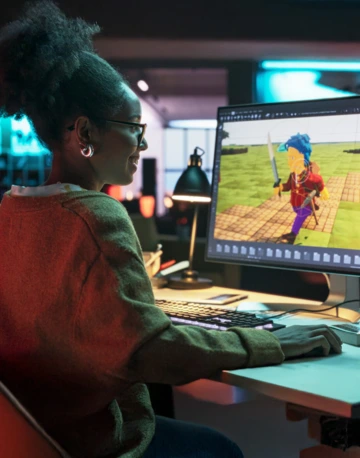Game Design & Development
Bachelor of Science
Quick Facts

#12
Public Virtual/Augmented Reality
Schools & Colleges in the U.S.
- Animation Career Review, 2024
#22
Public Game Design
Schools in the U.S.
- Animation Career Review, 2025
The University of Arizona’s STEM-designated Bachelor of Science in Game Design and Development, offered fully online through Arizona Online, prepares students to lead at the forefront of the game design industry. This forward-looking degree empowers students with both the creative and technical expertise to design, develop, and evaluate compelling game experiences across a wide range of platforms and industries.
Students in the program gain hands-on experience in game conceptualization, market analysis, technical design, and usability testing. Whether the goal is to revolutionize entertainment, transform educational methods, pioneer new applications in healthcare, or elevate training technologies, this program equips students to lead. Further, students will master critical professional skills in research, ethical decision-making, and cross-functional team collaboration within creative tech-driven settings.
Graduates of the program will be ready to design meaningful, immersive game experiences using proven principles of gamification, storytelling, user interaction, and engagement. After completing this program, you will have the skills to develop and deploy games with hands-on experience in industry-standard tools, platforms, and production environments and be able to pursue diverse, in-demand careers throughout the game industry and beyond.
- Program requires Math 113, Math 116 or Math 122B or higher.
- A minor is required for the Bachelor of Science in Game Design and Development.
*Residents of some U.S. Territories may not be eligible. Please see our Eligibility & State Authorization page for more information.
The curriculum for this program includes:
An introduction to computational techniques and using a modern programming language to solve current problems drawn from science, technology, and the arts. Topics include control structures, elementary data structures, and effective program design and implementation techniques.
This course explores the social, legal, and cultural fallout from the exponential explosion in communication, storage, and increasing uses of data and data production. In this class, we emphasize the opposing potentials of information technologies to make knowledge widely available and to distort and restrict our perceptions.
This course provides an introduction to game design and teaches students the fundamental concepts for creating games. Students will survey many different games, exploring the issues game designers face when designing games in different genres. Students will participate in a series of game design challenges and will be responsible for designing and prototyping simple games using a game building tool.
This course provides a comprehensive survey of video game production practices. Students work on game development assignments for presentation in a professional portfolio. The course topics include: collaborative technologies, software design patterns for games, spatial transformations, and technical considerations surrounding game art, such as authoring sprites, 3D models, animations, texture mapping, and writing shaders.
3D modeling is a vital component of game design and development. In this course, students will learn the foundations of 3D modeling as applied to interactive video games. Essential techniques for creating and optimizing 3D assets will be covered, such as polygonal modeling and texture mapping. Emphasis will be placed on optimizing 3D models for performance and visual fidelity for real-time rendering in interactive video games and applications.
Virtual reality (VR) is an emerging technology that has recently been widely used in various areas, such as education, training, well-being, and entertainment. VR offers a highly immersive experience as the head mounted displays surround a 360-degree view of the user. It encompasses many disciplines, such as computer science, human computer interaction, game design and development, information science, and psychology. This course merges a theoretical and practical approach to give students the necessary knowledge that is required to design, develop, and critique virtual reality games and applications.
Algorithms are a crucial component of game development. This course will provide students with an in-depth introduction to algorithm concepts for game development. The course will cover basic algorithm and data structures concepts, basic math concepts related to game algorithms, physics and artificial intelligence based game algorithms that are supplemented with modern examples. Unity Game Engine along with C# programming language will be used throughout the class.
Outcomes
Skills
Earning your Bachelor of Science in Game Design & Development will build core skills, including:
- Programming
- Creativity
- Problem solving
- Virtual reality
- Digital storytelling
- Collaboration
- Communication
- Project management
- Game engine knowledge
- Human-computer interaction
- Knowledge of game design principles
- Version control systems
- 3D/2D graphics & animation
Potential Career Paths
Graduates of the Game Design & Development BS program will be prepared to pursue the following career fields:











